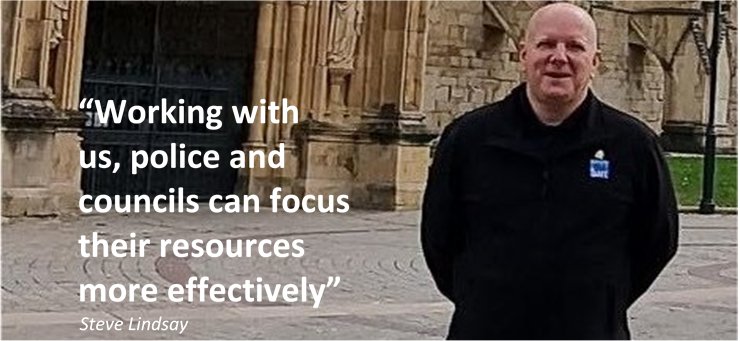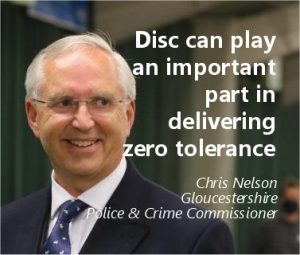Driving down low-level crime and ASB in Gloucester and beyond

Set up in 2014, Gloucester City Safe is one of the UK’s most successful – and certainly the most studied – business crime reduction schemes in the UK. And at the heart of its success is Disc.
From scratch, Gloucester City Safe has grown both geographically (it now covers the neighbouring town of Stroud) and functionally (for example it played an important part in delivering local response during the Covid emergency).
City Safe is a collaboration between the city’s local retail and leisure sector businesses, Business Improvement District, police and councils, all of which share the aim of ensuring everyone can live, work and socialise in Gloucester free from harm or intimidation, and, since 2016, in neighbouring Stroud too.
The scheme has been outstandingly successful in achieving that aim, as evidenced by research carried out by Gloucester University’s criminology students who have studied City Safe’s activities and its impact on low-level business crime and ASB over more than five years.
Exclusion Scheme
Key to its success has been City Safe’s exclusion scheme. Steve Lindsay has run City Safe and its exclusion scheme since 2018: “Our members share information about local trouble-makers in the form of incident reports. If an individual is reported for a qualifying incident, they are given a Yellow Card, and if they’re cited in a further incident within 12 months, they get another one.
“Usually that means we visit them and have a serious conversation” says Lindsay, who joined City Safe after 20 years as a business operations manager for a large IT company. “It’s an opportunity to get them to understand the implications of what they have done and what will happen if they carry on offending. Just having this contact with them is often all they need to get them to improve their ways. But if they offend again, that’s when they’re excluded from members’ premises.
Exclusion from the premises of all scheme members across the city (a separate but identical scheme covers Stroud) is a substantial sanction. “If they want to go shopping, or fancy a drink, they’ll have to do it outside the City Centre – or Stroud – for the next 12 months”.
The exclusion is a civil sanction, administrated and operated entirely independently of police, based on members’ common law right to deny access to their premises to anyone who represents a threat to their property, or staff, or customers. But for persistent offenders who still don’t get the message – or refuse to hear it – City Safe works with police to apply for Criminal Behaviour Orders, a breach of which constitutes a criminal offence.
The scheme is strongly supported by the police and local councils. “They recognise that we’re effective at addressing and reducing local low-level business crime and ASB – of which there is a great deal in any town or city-centre”, says Lindsey. “We work with police to help identify prolific, sometimes professional offenders, on whom they can concentrate their resources to bring them to justice. Working with us, police and councils can focus their resources more effectively on more prolific offenders or those with profound behavioural problems”.
City Safe provides a range of options to offenders who wish to choose them. It liaises closely, for example, with Young Gloucestershire, an enterprise supporting disadvantaged young people who are facing challenges in their lives, and with Restorative Gloucester, a group of community organisations that offer opportunities to participate in ‘restorative justice’.
Under the microscope
City Safe is certainly the most studied business crime reduction scheme in the UK.
Since 2015, students at the University of Gloucestershire have been studying it with the aim of answering two key questions: does the scheme help reduce low-level crime and, if so, by how much?
Their work shows that almost four out of every five first-time offenders do not go on to full exclusion. Of those that do, one-in-three doesn’t re-offend again. And the study shows, interestingly, that offenders that do re-offend tend not to do so in the premises in which they had previously been reported. You can read a summary of the research here.
City Safe and Disc
From its inception in 2014, Gloucester City Safe has used Disc. “We have to provide a cost-effective service to our membership,” says Lindsay, “and Disc is essential to that. It means that I can support the entire scheme – and build its membership – as well as maintain a constant two-way flow of information between our ever-growing membership and police. I simply couldn’t do it without Disc”.
Disc also provides ‘direct-to-police’ crime reporting allowing members to escalate incidents into Crime Reports, emailed direct to police. Reporters receive a Crime Report number more quickly, and without the need to phone-through to police 101. The system is heavily used, and usage is growing – even through Covid. In 2020, City Safe’s Disc system handled over 32,000 logins, 1,331 incident reports were submitted into the system of which 162 were escalated as crime reports to police; 2021 stats show further growth.
“Obviously, running an exclusion scheme is a delicate business; we’re dealing with difficult – sometimes vulnerable – individuals, and we have a duty to them as well as to our members. Apart from enabling us to manage incidents and the exclusion scheme itself, and sharing current awareness among members, Disc helps us operate in strict compliance with all-important data protection law”.
Disc has been designed from the first to be ‘compliant by design’ ensuring that information is processed compliantly. “At the end of the day, it’s not Disc’s responsibility to ensure compliance – it’s our own” says Lindsay. “But Disc provides the technical security that we need, plus many built-in features which makes compliance easy. The people behind Disc also provide a full set of ‘model documents’ which has made it easy to develop our own mandatory documentation and to secure full accreditation to the National Standards criteria managed by Secure by Design.
“Disc is crucial to us: it looks after so many of the procedural elements of the work, so it leaves more time for the interpersonal stuff that is so crucially important”. During Covid, the local City Protection and Neighbourhood Policing teams also used City Safe’s Disc to manage Covid-19 non-compliance, supporting local Covid Marshalls across all six local council districts throughout Gloucestershire.
Steve Lindsay says he’s looking to expand the use of Disc, hopefully county-wide, in the near future to take advantage of the scalability and adaptability of the cloud-based system.
Gloucestershire’s Police & Crime Commissioner (PCC) Chris Nelson has set out plans to bring all six districts across the county into the scheme, as well as to develop rural schemes to support more remote communities.
According to Chris Nelson, “There is hard evidence over a long period to support the claim that Gloucester has the best city-centre business crime reduction partnership in the country, and I would like it to be said about the whole of Gloucestershire as well. Always striving to be better than we are drives  up standards, and that is my aim.
up standards, and that is my aim.
“I have promised a zero-tolerance approach to anti-social behaviour because it’s what the public tell me they want. Disc’s role in providing instant communications and information can play an important part in delivering that. Gloucester, Cheltenham [another Disc user] and Stroud are great examples of what can be achieved through partnership working and I am committed to working with all six districts across the county to reducing low level crime and anti-social behaviour throughout Gloucestershire”.